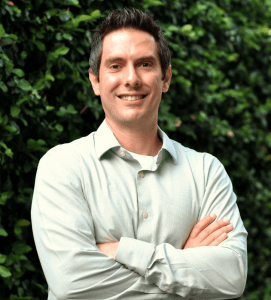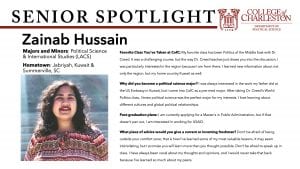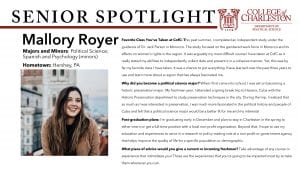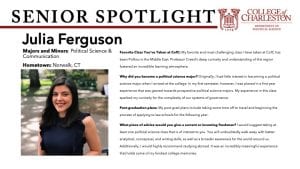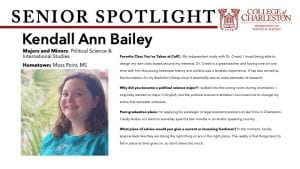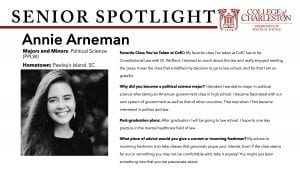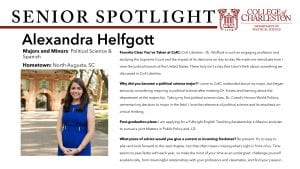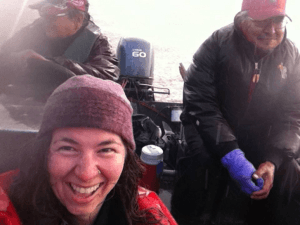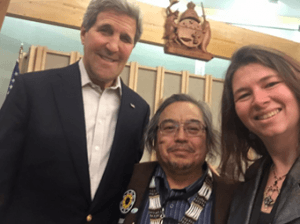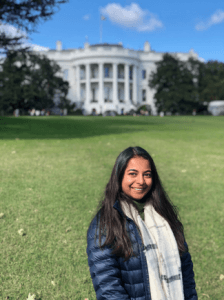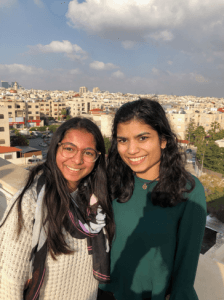 “I would not trade my experience at the College of Charleston for ten Ivy League degrees,” says Rhodes Bailey, who graduated from the College in 2003. Bailey came to the College knowing he wanted to study political science, having been interested since a young age. “I’ve always been a nerd for politics,” he happily admits, “and I took way more classes in political science than I needed for my degree!”
“I would not trade my experience at the College of Charleston for ten Ivy League degrees,” says Rhodes Bailey, who graduated from the College in 2003. Bailey came to the College knowing he wanted to study political science, having been interested since a young age. “I’ve always been a nerd for politics,” he happily admits, “and I took way more classes in political science than I needed for my degree!”
Now a practicing lawyer, Bailey recently began his campaign for a seat in the South Carolina House of Representatives. “I think the best days in South Carolina are ahead of us, if we’re not afraid to try something new,” he explains, adding, “this is the most important election of our lives.” After feeling frustrated for some time with the lack of change and increasing corruption of the state legislature, Bailey decided now was the time to run. He wants to shake things up a bit in the House, because he feels incumbents are getting too comfortable in their positions and are losing touch with their constituents, citing the failure of the legislature to give raises to South Carolina educators as a prime example. He says, “there’s no change unless people are willing to take risks.”
Bailey is excited at the prospect of making a difference in the state he calls home, especially because he’s lived here all his life. He has always been involved in politics, from being elected student body president as a junior during his time at the College to working on election protections as a lawyer years later. He is confident in his chances of winning the election, calling his Columbia home a “purple district” that can absolutely be flipped in the next election. He stresses the importance of this election cycle, adding, “I believe that we have to compete in every viable race we can to make the biggest impact.” Bailey believes his background in political science and law makes him a great candidate for the job.
During his time at the College, Bailey made sure to pursue all of his passions, both in and out of the classroom. He became involved in the Student Government Association immediately upon arriving on campus, serving as a freshman senator. He served as student body vice president his sophomore year and then as president his junior year, which, he says, was an interesting time (Bailey’s first SGA meeting as president was on September 11, 2001). Bailey was also an avid guitar player; his high school summer music program at CofC was actually one of the main reasons he came here. “He played a pretty mean Beatles cover back in the day,” recalls Dr. Mark Long, professor of geography and political science.
Bailey loved not only the political science department but the College’s liberal arts education in general. “You don’t realize how special a liberal arts school is until you meet people who went to other programs,” he explains, stressing the importance of learning “something about everything.” He certainly took this idea to heart, taking theatre and songwriting classes “just for fun.” He says one of his favorite classes, aside from those in political science, of course, was theatre script analysis.
Bailey also took advantage of all the courses the political science department offered, taking as many as would fit in his schedule. He especially loved the classes he took with Dr. Curtis and Dr. Moore, though he made sure to emphasize his appreciation for the entire department; “I never had a class or a professor I didn’t like.” He often tells people how life-changing the political science department was for him. He adds, “when you’re in a place and at a college you love, there seems to be no limit to what you can do!”
When asked about his time in law school, Bailey admits that it was challenging and demanding, but he stresses how well the College prepared him for that challenge. He has been practicing law for twelve years now, beginning as a public defender and moving to civil defense, before taking a short break to teach criminal justice at Keystone College. He has since returned to public defense in Columbia, where he is now Chief Litigator. Though he loves his job and his problem-solving role, he wants to become a state representative because, “sometimes I see the bigger problems we’re facing, and I want to take steps toward bigger solutions.”
Bailey has lots of advice for political science students today, but he emphasizes the importance of stepping out of one’s comfort zone. “Don’t be afraid to try something new. Don’t just stick to what’s safe. Don’t be afraid to challenge yourself and try something different.” He also encourages students not to take these few years for granted, saying, “take the time to enjoy learning for the sake of learning. You’ll miss school when you’re older.” Bailey regrets not taking as many international relations classes as he could have, and encourages students to take as many courses as possible in the fields they are interested in. On the subject of law school, he says, “law school is not for everyone, but it’s a life changing experience. It molds minds.” To students interested in government and campaigns, he stresses, “just show up. Adventure will find you.” Bailey took some time off after he graduated before continuing his education, and he wants students to know that they don’t have to go straight into graduate school. Overall, Bailey encourages students to get involved and cherish the time they have in college. He says, “there’s something so exciting and magical that happens in a college classroom.”
 Certainly nobody expected to be packing their bags to go home for the semester at the beginning of March, 2020. But for some students, the journey home when campuses closed was a little longer than most. One of our very own Political Science majors, Abigail Martuscello, was studying abroad in Haifa, Israel when things began shutting down around the globe. Abigail was spending her semester abroad, funded by the prestigious Gilman Scholarship, a nationally competitive award open to college students who are receiving Pell Grant funding.
Certainly nobody expected to be packing their bags to go home for the semester at the beginning of March, 2020. But for some students, the journey home when campuses closed was a little longer than most. One of our very own Political Science majors, Abigail Martuscello, was studying abroad in Haifa, Israel when things began shutting down around the globe. Abigail was spending her semester abroad, funded by the prestigious Gilman Scholarship, a nationally competitive award open to college students who are receiving Pell Grant funding.  solution.” In order to dive into this problem, she decided to spend a semester immersed in it.
solution.” In order to dive into this problem, she decided to spend a semester immersed in it. 



